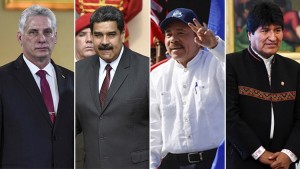Carlos Sánchez Berzaín
February 20, 2019
(Interamerican Institute for Democracy) The inexistence of separation and independence of the branches of government and the rule of law, are features of dictatorships and make it evident as the most palpable proof, their manipulation of justice. The use of judicial prosecution to intimidate, persecute, subordinate and/or eliminate members of the opposition, journalists, businessmen, and society’s civic leaders, is a common practice of 21st Century Socialism’s regimes in Cuba, Venezuela, Nicaragua, Bolivia, and Ecuador. Rulings that are issued under these conditions by judges who are at the regime’s service are “despicable rulings” that ought not to be validated, nor applied, by democratic states.
I consider a “despicable ruling” as “a judge’s or tribunal’s decision that in its content or resolution violates human rights and/or fundamental freedoms”. In essence, it is about acts of prevarication. When judges protect the importance of the Constitution, freedom, fundamental rights, and the equality of all in the eyes of the law, there is rule of law. On the other hand, when these judges subordinate themselves to the political whim of the regime that holds power and act in their service, their adequacy, impartiality, and independence, disappears giving way to the “despicable rulings”.
The Judicial Branch is the government’s institution responsible for administering “justice” which consists of “rulings on what is just, in a concrete case presented to a judge or tribunal”. Justice is the “moral principle that motivates someone to do or to judge, respecting the truth and rendering on each case what is rightfully deserved”. The Judicial Branch must be independent and judges must be adequate, impartial, and independent. Socrates once said that “four features are part of a judge; to listen with courtesy, to respond wisely, to ponder with prudence, and to decide impartially”.
In Cuba, since 60 years ago with Fidel Castro, Raul Castro, and Diaz-Canel, in Venezuela since 20 years ago with Hugo Chavez and Nicolas Maduro, in Bolivia with Evo Morales since 13 years ago, in Nicaragua with Daniel Ortega since 12 years ago, and in Ecuador in the 10 years of Rafael Correa’s regime –with consequences up to now- the Judicial Branch is not independent, it was reduced to become a government’s institution and turned into the most efficient means of repression, persecution, intimidation, and elimination. Despicable judicial rulings issued in Cuba, Venezuela, Nicaragua, Bolivia, and Ecuador, are the basis of unlawful arrests, political prisoners, seizures, appropriation of communications’ enterprises and media, extortion, forced confessions of crime that was never committed, persecution and exile.
The misuse of the judicial under a dictatorship is the “judicialization of repression” and is the nucleus of the Castroist Chavist methodology. It uses, basically, but not exclusively, the penal side to falsely accuse its victims to have committed serious crimes, to prosecute and sentence them with ensuing national and international consequences. Dictatorships assassinate the victims’ reputation, jail them, seize their assets, and take them to misery and even if those persecuted go into exile, they still endure the weight of the infamy resulting from unlawful, despicable judicial rulings that brand them for false crimes and the persecution never ends.
Simulating grievous crimes, the dictatorships power on behalf of the State, expands with the International Police [INTERPOL] to whom the regimes send “alerts” identifying those politically persecuted as common and dangerous criminals. They, then manipulate their extradition requests. They disseminate the accusations of alleged crimes and the issuance of despicable rulings and publicly pressure democratic governments to have reciprocity, emphasizing that their justice is applicable to those accused irrespective of the victims’ migratory status, they block the victims’ requests for asylum or their need for work, getting to the point of having those victims arrested, or their entry into another State rejected, and having deportation proceedings started.
Democratic nations cannot apply and legitimize judicial prosecutions and rulings from the non-democratic regimes of Cuba, Venezuela, Nicaragua, Bolivia, and Ecuador, above it all on penal matters against publicly well-known victims who are prisoners of or are persecuted by those regimes.
The world’s democracies must reassess judicial rulings – that pretend to be applied in their jurisdiction- issued by Cuba, Venezuela, Bolivia, Nicaragua, and Ecuador given that their acceptance extends to countries with democracy and independent justice, the violations of the due-legal process, the presumption of innocence of the accused, the equality of the parties under the law, the right to an impartial judge, and others.
Published In Spanish by Infobae.com on Sunday, February 17th, 2019
Translated from Spanish by; Edgar L. Terrazas, member of the American Translators’ Association, ATA # 234680.
 Carlos Sanchez Berzain Abogado | Estadista | Político | Politólogo
Carlos Sanchez Berzain Abogado | Estadista | Político | Politólogo
